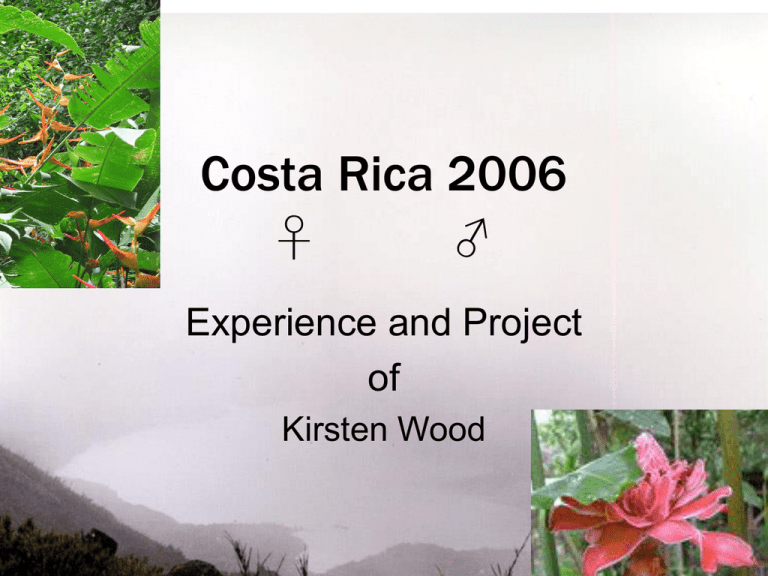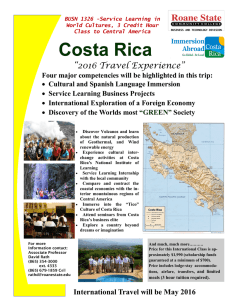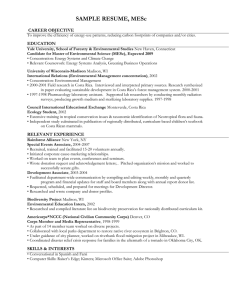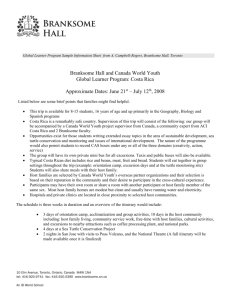Costa Rica 2006 ♀ ♂ Experience and Project
advertisement

Costa Rica 2006 ♀ ♂ Experience and Project of Kirsten Wood About Me •Issaquah, Washington •Sophomore at University of Washington •What to study? •Mechanical Engineering •Latin American Studies •Environmental Studies •Math •Chocolate •Soccer Why Costa Rica? •Latin America •Environmentally significant •Various ecosystems •Cultural changes •Sustainable practices •Attracts attentionconservation Goals •Practice Spanish •Learn about sustainability •Experience tropical environment •Multiple terrains •Gain global perspective •Independent project Conclusions •Spanish-inherent in being in Costa Rica •Project forced use •Use of ‘Usted’ and ‘y’ •Environment •Recycling •So much Waste! •Impact with burn/burry garbage •Constant warmth, noise •Storms •Fauna/ Flora-evolution and defense •Global perspective •Ticos have better understanding •Value relationships Independent Project •Gender Roles •Social perceptions of Ticos and Ticas •Value in society •Views of life •Why? •Force cultural interaction/observation Objective • Male vs. female perceptions • Do opportunities for men/women differ? • How does gender affect daily life? • Significance of gender in society • Variations of equality across communities • Compare societal views of gender roles with US • Collect personal accounts – emotion, experience and the culturally unpredictable Background •Male dominated society •Strong Catholic cultural base •Recent female empowerment •Fischel Volio •1998-2002 2nd Vice-President •Elizabeth Odio Benito •1998-2002 1st. Vice-President Astrid Background •Locations •Mastatal •Rural •Monteverde and Alajuela •Urban, Western influence Methods •Observations •In the home •Between family •Personal interactions •Survey •Questions from WorldValuesSurvey.org •Range over gender and age group •Interview •Open-ended questions •Focused on females •Troubleshoot Methods •Survey •Became supplemental •More value in verbal survey •Participants added anecdotes •Allowed flexibility •Essentially lots of interviews •Interviews •Imbalance: women more likely to open up •Welcoming, open, fascinating •Observations •Informal Data •Analyzed 5 questions •Compared with USA results •Also looked in comparison to other countries •Experiences harder to record/present If someone says a child needs a home with both a father and a mother to grow up happily, would you tend to agree or disagree? Question 8 120 Percentages 100 CRMale CRFemale USMale USFemale 80 60 40 20 0 1 Disagree 2 Responses Agree Results •Some Americans feel both are not needed to raise a child well •Every Tico believed both are needed •Rural (majority of sample) vs. Urban •Man brings in enough money, Women does domestic duties •Both parents need work to provide for kids •Women bring kids to work with them •Importance of mother influence and special bond •Commonly absent fathers •Generation differences •Women refuse to be trapped at home •Value of family remains •Men still not active in child rearing For the following statement, tell me how much you agree: University education is more important for a boy than a girl Question 11 Percentage 70 60 50 40 CRMale CRFemale USMale USFemale 30 20 10 0 1 Strongly Agree 2 3 Response 4 Strongly Disagree Results •More women than men disagreed that college education is more important for males •More Costa Rican women were strongly against that statement than American women •More American men were strongly against it than Costa Rican men. •Power of education •Dominant men- attempt to keep power •Women have newer right- hold tighter •Informal Observations •Girls took school more seriously Do you think abortion can always be justified, never be justified, or something in between Question 31 120 Percentages 100 CRMale CRFemale USMale USFemale 80 60 40 20 0 1 2 3 4 5 6 7 8 9 Responses Never Always 10 Results •Vast majority of Tico sample thought abortion was never justified •American opinion is far more disperse with relative equality between the male and female opinion •Females are slighted more towards abortion never being justified •Abortion is illegal •Many people still get abortions •Had abortion despite religion •So she could work/care for other children Do you agree or disagree with the statement: When jobs are scarce, men should have more right to a job than women. Number 37 90 80 Percentage 70 CRMale CRFemale USMale USFemale 60 50 40 30 20 10 0 1 2 3 Response Agree Disagree Neither Results •Many Costa Rican women agreed •Most Americans disagreed •Costa Rican men said neither •Women still feel less valuable in the working world •Fight for female rights in Costa Rica stronger while the economy is up •Men somewhat neutral •Partial acknowledgement of the passing of chauvinism. • A woman said that if the wife makes more than the husband, then the wife would simply leave him • Suggests women need men for income, if financially independent do not want husband •Old cultural values still an influence How much freedom of choice and control you feel you have over the way your life turns out. Question 38 100 Percentage ge 90 80 CRMales CRFemale USMales USFemale 70 60 50 40 30 20 10 0 1 2 None at all 3 4 5 6 7 Amount of Influence 8 9 10 A great deal Results •Costa Rican women averaged 7.25 compared to the 8 for Costa Rican men •American women averaged 7.94 and men at 8.02 •Women in US and CR averaged lower than men •Difference of American means < .1 Costa Rican mean discrepancy .75. •Possibly: US women’s rights movement lost fervor and •Americans like to feel total control •Women’s movement taking root in younger generations in Costa Rica •Younger girls feel lowest amount of control, older women feel the highest • Possibly: With age one understands how life unfolds, determine power individual decisions •New generation of women feel restrained, see opportunity for change, see possibilities Conclusion •New generation focused on equality •Options vs. duty •Strong females everywhere •Urban and Rural •Social expectations exist but normal to break •Typical female=domestic •Men in tough spot Future •Similarly structured questions to WorldValuesSurvey •possibly subtle affect on the responses •Extremely narrow sample •focused on a specific area •More samples and to extend the study to more urban areas. •Charted results to other questions with several other countries’ data • Interesting but brief •Compare across several international communities •more questions •age ranges •each gender Personal Effects •Definitely go back •Beautiful country •Will I stay changed? •The people •The land •Will I remember? •Influenced me •Life without materials •Importance of family •Minimize impact Works Cited •Beletsky, Les. Costa Rica: Travellers' Wildlife Guides. Northampton, MA: Interlink Publishing Group, Inc, 2005. •"Bienvenidos al Rancho." Rancho Mastatal: Enviornmental Learning Center and Lodge. 19 Aug 2006. Rancho Mastatal. 18 April 2006 <http://www.ranchomastatal.com/home.php>. •Biesanz, Mavis Hiltunen, Richard Biesanz, and Karen Zubris Biesanz. The Ticos: Culture and Social Change in Costa Rica. Boulder, CO: Lynne Rienner Publishers, Inc, 1999. •"Cloud Forest." Monteverde Costa Rica. 1998. Instituto Costaricense de Turismo. 22 Sep 2006 <http://www.monteverdeinfo.com/>. •Inglehart, Ronald. World Values Survey. 200. 10 Sep 2006 <http://www.worldvaluessurvey.org>. •Leitinger, Ilse A. The Costa Rican Women's Movement. 29. Pittsburg, PA: University of Pittsburg Press, 1996. •Stein, Laura Guzman and Anne Letendre Morales . "Gender and education in Costa Rica." (2004) 11-15. 06 June 2006 Lo que paso, paso Entre tu y yo THE END Any Questions??



